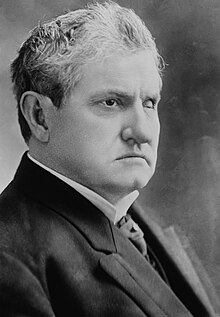
Back بنجامين راين تيلمان Arabic بنجامين راين تيلمان ARZ Benjamin R. Tillman AST بنجامین تیلمن AZB Benjamin Ryan Tillman Breton Benjamin Tillman German Benjamin Tillman Spanish بنجامین تیلمن Persian Benjamin Tillman French בנג'מין טילמן HE
Ben Tillman | |
|---|---|
 | |
| United States Senator from South Carolina | |
| In office March 4, 1895 – July 3, 1918 | |
| Preceded by | Matthew Butler |
| Succeeded by | Christie Benet |
| 84th Governor of South Carolina | |
| In office December 4, 1890 – December 4, 1894 | |
| Lieutenant | Eugene B. Gary (1890–1893) Washington H. Timmerman (1893–1894) |
| Preceded by | John Peter Richardson III |
| Succeeded by | John Gary Evans |
| Personal details | |
| Born | Benjamin Ryan Tillman Jr. August 11, 1847 Trenton, South Carolina, U.S. |
| Died | July 3, 1918 (aged 70) Washington, D.C., U.S. |
| Political party | Democratic |
| Spouse |
Sallie Starke (m. 1868) |
| Children | 7 |
| Relatives | George Dionysius Tillman (brother) James H. Tillman (nephew) |
| Education | South Carolina College |
| Signature | |
Benjamin Ryan Tillman (August 11, 1847 – July 3, 1918) was a politician of the Democratic Party who served as governor of South Carolina from 1890 to 1894, and as a United States Senator from 1895 until his death in 1918. A white supremacist who opposed civil rights for black Americans, Tillman led a paramilitary group of Red Shirts during South Carolina's violent 1876 election. On the floor of the U.S. Senate, he defended lynching, and frequently ridiculed black Americans in his speeches, boasting of having helped kill them during that campaign.[1]
In the 1880s, Tillman, a wealthy landowner, became dissatisfied with the Democratic leadership and led a movement of white farmers calling for reform. He was initially unsuccessful, though he was instrumental in the founding of Clemson University as an agricultural land-grant college. In 1890, Tillman took control of the state Democratic Party, and was elected governor. During his four years in office, 18 black Americans were lynched in South Carolina; in the 1890s, the state had its highest number of lynchings of any decade. Tillman tried to prevent lynchings as governor but also spoke in support of the lynch mobs, alleging his own willingness to lead one. In 1894, at the end of his second two-year term, he was elected to the U.S. Senate by vote of the state legislature, who elected senators at the time.
Tillman was known as "Pitchfork Ben" because of his aggressive language, as when he threatened to use a pitchfork to prod that "bag of beef", President Grover Cleveland. Considered a possible candidate for the Democratic nomination for president in 1896, Tillman lost any chance after giving a disastrous speech at the convention. He became known for his virulent oratory—especially against black Americans—but also for his effectiveness as a legislator. The first federal campaign finance law, banning corporate contributions, is commonly called the Tillman Act. Tillman was repeatedly re-elected, serving in the Senate for the rest of his life. One of his legacies was South Carolina's 1895 constitution, which disenfranchised most of the black majority and many poor whites, and ensured white Democratic Party rule for more than six decades into the 20th century.
- ^ Simkins 1944, pp. 396–397.